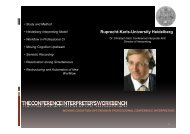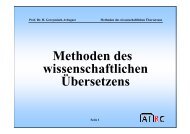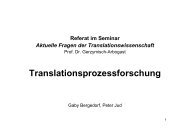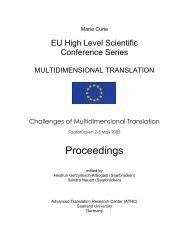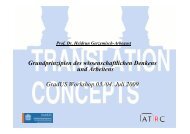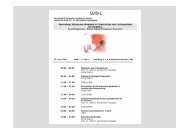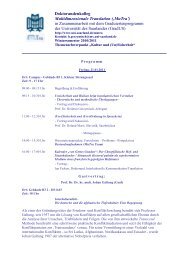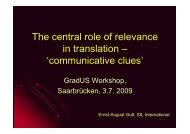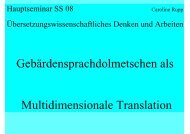Proceedings - Translation Concepts
Proceedings - Translation Concepts
Proceedings - Translation Concepts
You also want an ePaper? Increase the reach of your titles
YUMPU automatically turns print PDFs into web optimized ePapers that Google loves.
MuTra 2006 – Audiovisual <strong>Translation</strong> Scenarios: Conference <strong>Proceedings</strong><br />
Lena Hamaidia<br />
2.1 Word order: contrastive linguistics’ different ways in which languages express<br />
meaning through structure<br />
This study, will concentrate on how sentence structure, in the sense of word order, can affect<br />
affective meaning in the translation of spoken dialog into subtitles.<br />
Sentences are composed of different elements, which can be combined in different ways<br />
to create different meanings. The organization of words in a sentence produces its meaning.<br />
The three basic elements in the structure of a sentence are the subject, the object and the verb<br />
and there are variations across languages in the way in which these elements are ordered.<br />
In her study of linguistic typology, Jae Jung Song observes that there are two methods of<br />
ordering sentence constituents in languages; “Basic word order” and “flexible or free word<br />
order”(Song 2001: 1,2). Jung Song’s categories correspond to Johnson’s distinction between<br />
“syntactic” and “pragmatic” word order (Johnson 1998: 172) or Bally’s distinction between<br />
“ordre grammatical” and “ordre psychologique”(Bally 1944: 106).<br />
In syntactically ordered sentences the sequence of the sentence elements is determined<br />
purely by grammatical function whereas in pragmatically ordered sentences the sequence of<br />
the sentence elements is determined by the communicative intention of the speaker.<br />
(a) Example of syntactically ordered sentence:<br />
Subject Verb Object<br />
(a) She kept the weekends open for me.<br />
(b) Example of pragmatically ordered sentence:<br />
Object Subject Verb<br />
The weekends she kept open for me. (Cornwall’s example cited in Schmid<br />
1999: 118)<br />
Thus whilst syntactic or basic word order is characterized by rigidity and focused on the<br />
information content of the message, pragmatic or communicative word order is characterized<br />
by flexibility and focused on the impact of the words, which goes beyond the factual content<br />
of the message. By altering the order of the sentence elements from the syntactic SVO<br />
(subject, verb, object) order in sentence (a) above to a pragmatic object subject verb order in<br />
sentence (b) the writer has introduced a new focus and emphasis on “the weekends”, which is<br />
not present in the syntactically ordered sentence.<br />
This study will concentrate on the translation of pragmatically ordered sentences. It could<br />
be argued that pragmatically ordered sentences are particularly associated with spoken<br />
communication where emphasis and emotion tend to be expressed spontaneously by the<br />
speaker, which in itself has implications for the subtitling process.<br />
2.2 Word Order and Information Structure<br />
As Schmid observes; word order plays an important role in the information flow of the<br />
message: „information is predominantly coded by word order in most languages” (Schmid<br />
1999: 27)<br />
As Finegan explains, in contrast with syntactic structure, which is language-specific,<br />
categories of information structure are not language-dependent. As the encoding of pragmatic<br />
information is one of the main functions of syntax, the way in which this information is<br />
conveyed varies in accordance with the syntactic structures of different languages. (Finegan<br />
1989: 199) The translator therefore needs to develop sensitivity to the pragmatic function of<br />
the word order which is determined by the syntactic constraints of the Source Language in<br />
order to be able to transfer it into the Target Language.<br />
36



